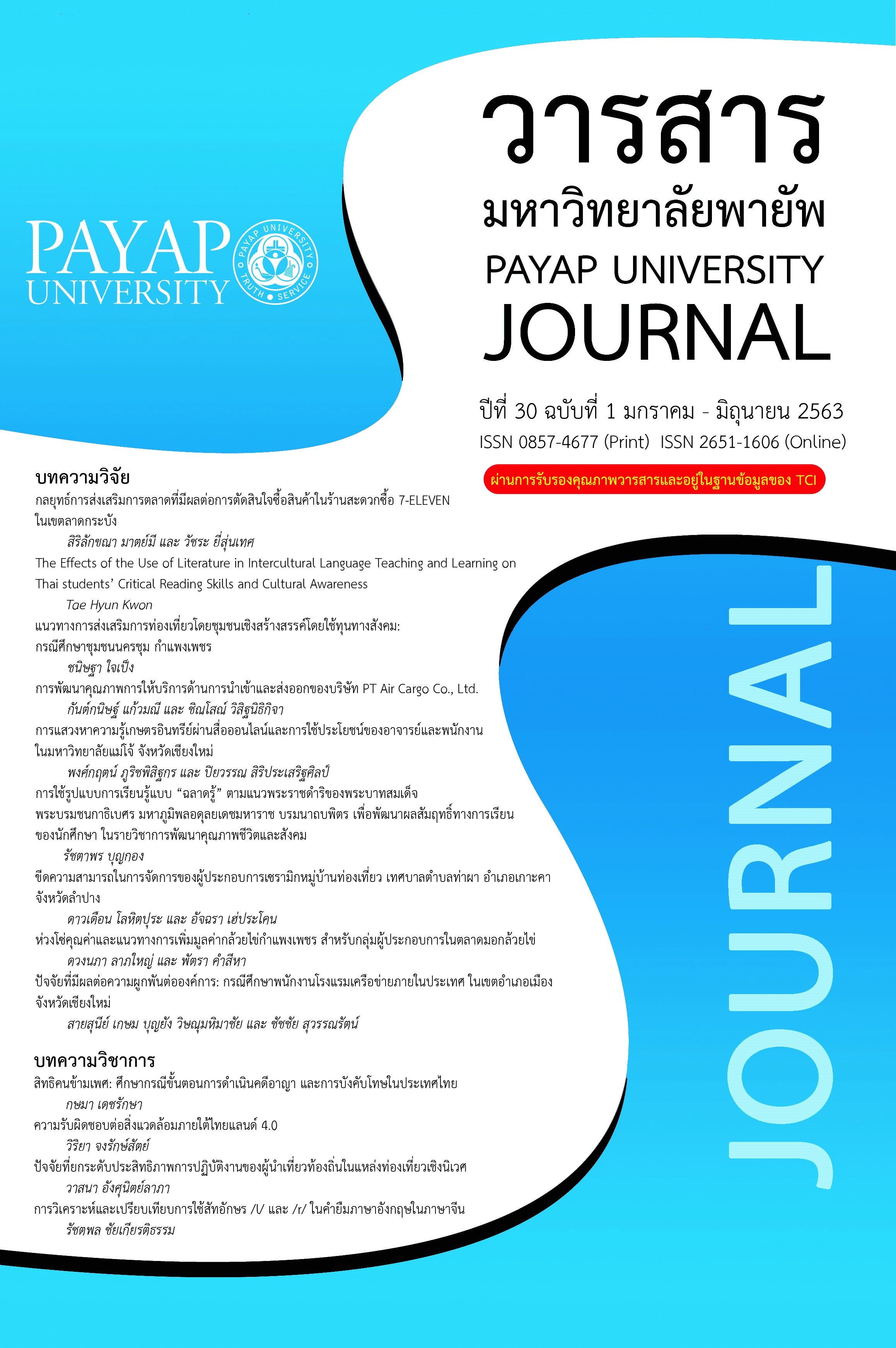สิทธิคนข้ามเพศ: ศึกษากรณีขั้นตอนการดำเนินคดีอาญา และการบังคับโทษในประเทศไทย
Main Article Content
บทคัดย่อ
มนุษย์ทุกคนเกิดมาพร้อมกับภาวะเพศ โดยมนุษย์จะถูกจำแนกได้เป็นชายและหญิง ทำให้เกิดผลตามมาทั้งในเชิงสังคมและวัฒนธรรม พระคัมภีร์ไบเบิลบัญญัติว่า พระเจ้าสร้างมนุษย์คู่แรก คือ อดัมและเอวา เป็นคู่กัน เพื่อดำรงเผ่าพันธุ์มนุษย์ ความเป็นเพศชายและความเป็นเพศหญิงจึงถูกมองว่าเป็นสิ่งที่คู่กัน เพราะสามารถที่จะสืบพันธุ์และให้กำเนิดมนุษย์ได้ อย่างไรก็ตาม ภายใต้กฎเกณฑ์ตามธรรมชาติ มนุษย์สามารถที่จะมีรสนิยมทางเพศหรือความพึงพอใจทางเพศแตกต่างไปจากเอกลักษณ์หรืออัตลักษณ์ทางเพศของบุคคลนั้น ซึ่งรวมถึงกลุ่มของคนข้ามเพศ
ประเทศไทยมีกฎหมายรับรองสิทธิของกลุ่มความหลากหลายทางเพศ ซึ่งรวมถึงคนข้ามเพศอยู่แต่ยังไม่เพียงพอ แม้ว่าไทยจะเป็นรัฐภาคีของอนุสัญญาระหว่างประเทศต่างๆ เช่น ปฏิญญาสากลว่าด้วยสิทธิมนุษยชน กติการะหว่างประเทศว่าด้วยสิทธิพลเมืองและสิทธิทางการเมือง และอนุสัญญาว่าด้วยการขจัดการเลือกปฏิบัติต่อสตรีทุกรูปแบบ รวมถึงกฎหมายภายในประเทศ ได้แก่ กฎหมายรัฐธรรมนูญ พ.ศ. 2560 ที่รับรองสิทธิ เสรีภาพ และความเสมอภาคของประชาชนไว้ ประมวลกฎหมายวิธีพิจารณาความอาญา ฯลฯ แต่การปฏิบัติต่อผู้ต้องหาหรือผู้ต้องขังที่เป็นคนข้ามเพศ ยังคงเป็นปัญหาในขั้นตอน การดำเนินคดีทางอาญาและการบังคับโทษว่า เจ้าหน้าที่ผู้ปฏิบัติงานจะมีแนวปฏิบัติต่อบุคคลที่เป็นคนข้ามเพศอย่างไร จึงควรมีมาตรการทางกฎหมายเพื่อขจัดการเลือกปฏิบัติเพราะเหตุแห่งเพศ เพื่อให้เกิดความเสมอภาคทางเพศอย่างแท้จริง
Article Details
เอกสารอ้างอิง
กอบเกียรติ กสิวิวัฒน์. (2560, 22 มีนาคม). คอลัมน์ข่าวการเมือง. กรุงเทพธุรกิจออนไลน์. สืบค้นเมื่อ 23 มกราคม 2563. https://www.bangkokbiznews.com/news /detail/746426
จักรพันธ์ สอนสุภาพ. (2533). ปัญหาทางกฎหมายเกี่ยวกับการผ่าตัดแปลงเพศและบุคคลที่แปลงเพศแล้ว. วิทยานิพนธ์ปริญญามหาบัณฑิต คณะนิติศาสตร์ จุฬาลงกรณ์มหาวิทยาลัย.
ชาติ ชัยเดชสุริยะ. (2549). มาตรการทางกฎหมายในการคุ้มครองสิทธิมนุษยชนในกระบวนยุติธรรมทางอาญา. กรุงเทพฯ: โรงพิมพ์เดือนตุลา.
ชีรา ทองกระจาย. (ม.ป.ป.). หน่วยที่ 8 ความเท่าเทียมกันทางเพศสภาพ, สืบค้นเมื่อ 20 มกราคม 2563. https://www.stou.ac.th/Schoolnew/polsci/UploadedFile/82427-8.pdf.
ธัชพงษ์ วงษ์เหรียญทอง. (2558). การดำเนินคดีซ้ำ: ศึกษาผลคำพิพากษาต่างประเทศต่อการฟ้องคดีอาญาในประเทศไทย. วิทยานิพนธ์ปริญญาดุษฎีบัณฑิต คณะนิติศาสตร์ มหาวิทยาลัยธรรมศาสตร์.
นฤพนธ์ ด้วงวิเศษ และแจ็คสัน, พี.เอ. (บรรณาธิการ). (2556). เพศ หลากเฉดสี: พหุวัฒนธรรมทางเพศในสังคมไทย. กรุงเทพฯ: ศูนย์มานุษยวิทยาสิรินธร (องค์การมหาชน).
บรรเจิด สิงคะเนติ. (2558). หลักพื้นฐานเกี่ยวกับสิทธิเสรีภาพและศักดิ์ศรีความเป็นมนุษย์ (พิมพ์ครั้งที่ 5). กรุงเทพฯ: วิญญูชน.
ปิยลักษณ์ โพธิวรรณ์. (2554). คนข้ามเพศ ตัวตน วัฒนธรรมย่อย และพื้นที่ทางสังคม. วารสารบทความวิชาการดำรงวิชาการ, 10(1), 98-125.
พระราชบัญญัติแก้ไขเพิ่มเติมประมวลกฎหมายวิธีพิจารณาความอาญา (ฉบับที่ 28) พ.ศ. 2551. (2551). ราชกิจจานุเบกษา, 125 (ตอนที่ 30 ก), 1-15. สืบค้นเมื่อ 5 ธันวาคม 2562. http://www.ratchakitcha .soc.go.th/DATA/PDF/2551/A/030/1.PDF.
พระราชบัญญัติแก้ไขเพิ่มเติมประมวลกฎหมายอาญา (ฉบับที่ 27) พ.ศ. 2562. (2562). ราชกิจจานุเบกษา. 136 (ตอนที่ 69 ก), 127-134. สืบค้นเมื่อ 5 ธันวาคม 2562. https://library2. parliament.go.th/giventake/content_nla2557/law136-270562-127.pdf.
พระราชบัญญัติความเท่าเทียมระหว่างเพศ พ.ศ. 2558. (2558). ราชกิจจานุเบกษา, 132(ตอนที่ 18 ก), 17-27. สืบค้นเมื่อ 5 ธันวาคม 2562. http://www.ratchakitcha.soc.go.th/DATA/PDF/2558 /A/018/17.PDF.
พระราชบัญญัติราชทัณฑ์ พ.ศ. 2560. (2560). ราชกิจจานุเบกษา, 134(ตอนที่ 21 ก), 1-24. สืบค้นเมื่อ 5 ธันวาคม 2562. http://www.ratchakitcha.soc.go.th/DATA/PDF/2560/A/021/1.PDF.
รัฐธรรมนูญแห่งราชอาณาจักรไทย 2560. (2560). ราชกิจจานุเบกษา, 134(ตอนที่ 40 ก), 1-90. สืบค้นเมื่อ 25 ธันวาคม 2562. http://www.ratchakitcha.soc.go.th/DATA/PDF/2560/A/040/1.PDF.
วัชรินทร์ สังสีแก้ว. (2547). สถานะทางกฎหมายของผู้แปลงเพศ. การค้นคว้าอิสระปริญญามหาบัณฑิต คณะนิติศาสตร์ มหาวิทยาลัยธรรมศาสตร์.
วิษณุ เครืองาม. (2530). กฎหมายรัฐธรรมนูญ (พิมพ์ครั้งที่ 3). กรุงเทพฯ: นิติบรรณการ.
ศุภฤกษ์ ปลั่งศรีนนท์. (2557). ศึกษากฎหมายรับรองสิทธิของกลุ่มเพศทางเลือกในสังคมญี่ปุ่นกรณีศึกษาการยอมรับสิทธิในการครองคู่ของกลุ่มเพศทางเลือกปีการศึกษา. ปริญญานิพนธ์ สาขาวิชาภาษาญี่ปุ่น ภาควิชาภาษาตะวันออก คณะมนุษยศาสตร์ มหาวิทยาลัยเชียงใหม่.
สำนักงานคณะกรรมการกฤษฎีกา. ประมวลกฎหมายวิธีพิจารณาความอาญา (ฉบับ update19/02/2562). สืบค้นเมื่อ 25 ธันวาคม 2562. http://web.krisdika.go.th/lawHeadContent.jsp?from Page=lawHeadContent&formatFi le=htm&hID=1.
สำนักงานราชบัณฑิตยสภา. (2554). พจนานุกรมฉบับราชบัณฑิตยสถาน พ.ศ.2554, สืบค้นเมื่อวันที่ 25 ธันวาคม 2562. http://www.royin.go.th/dictionary/index.php
Juthas in law. (2556). บทวิเคราะห์และแนวคิดการรักร่วมเพศภายใต้กฎหมาย จากอดีตถึงอนาคต. สืบค้นเมื่อ 14 กุมภาพันธ์ 2561. http//juthas.exteen.com/20131009/entry.
The Office of the High Commissioner for Human Rights. (1948). The Universal Declaration of Human Rights. Retrieved December 25, 2019, from https://www.ohchr.org /EN/UDHR/Documents/UDHR_Translations/eng.pdf.
The Office of the High Commissioner for Human Rights. (1976). The International Covenant on Civil and Political Rights. Retrieved January 19, 2020, from https://www.ohchr.org /en/professionalinterest/pages/ccpr.aspx.
The Office of the High Commissioner for Human Rights. (1981). The Convention on the Elimination of All Forms of Discrimination Against Women. Retrieved January 19, 2020, from https://www.ohchr.org/documents/professionalinterest/cedaw.pdf.


